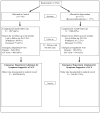A randomized clinical trial to reduce patient prehospital delay to treatment in acute coronary syndrome
- PMID: 20031889
- PMCID: PMC2802063
- DOI: 10.1161/CIRCOUTCOMES.109.852608
A randomized clinical trial to reduce patient prehospital delay to treatment in acute coronary syndrome
Abstract
Background: Delay from onset of acute coronary syndrome (ACS) symptoms to hospital admission continues to be prolonged. To date, community education campaigns on the topic have had disappointing results. Therefore, we conducted a clinical randomized trial to test whether an intervention tailored specifically for patients with ACS and delivered one-on-one would reduce prehospital delay time.
Methods and results: Participants (n=3522) with documented coronary heart disease were randomized to experimental (n=1777) or control (n=1745) groups. Experimental patients received education and counseling about ACS symptoms and actions required. Patients had a mean age of 67+/-11 years, and 68% were male. Over the 2 years of follow-up, 565 patients (16.0%) were admitted to an emergency department with ACS symptoms a total of 842 times. Neither median prehospital delay time (experimental, 2.20 versus control, 2.25 hours) nor emergency medical system use (experimental, 63.6% versus control, 66.9%) was different between groups, although experimental patients were more likely than control to call the emergency medical system if the symptoms occurred within the first 6 months following the intervention (P=0.036). Experimental patients were significantly more likely to take aspirin after symptom onset than control patients (experimental, 22.3% versus control, 10.1%, P=0.02). The intervention did not result in an increase in emergency department use (experimental, 14.6% versus control, 17.5%).
Conclusions: The education and counseling intervention did not lead to reduced prehospital delay or increased ambulance use. Reducing the time from onset of ACS symptoms to arrival at the hospital continues to be a significant public health challenge.
Clinical trial registration: clinicaltrials.gov. Identifier NCT00734760.
Conflict of interest statement
No real or perceived conflicts of interest exist for any of the authors of this manuscript.
Comment in
-
Patient education to reduce prehospital delay time in acute coronary syndrome: necessary but not sufficient.Circ Cardiovasc Qual Outcomes. 2009 Nov;2(6):522-3. doi: 10.1161/CIRCOUTCOMES.109.912188. Circ Cardiovasc Qual Outcomes. 2009. PMID: 20031888 No abstract available.
References
-
- McGinn AP, Rosamond WD, Goff DC, Jr, Taylor HA, Miles JS, Chambless L. Trends in prehospital delay time and use of emergency medical services for acute myocardial infarction: experience in 4 US communities from 1987–2000. American Heart Journal. 2005;150:392–400. - PubMed
-
- Goldberg RJ, Steg PG, Sadiq I, Granger CB, Jackson EA, Budaj A, Brieger D, Avezum A, Goodman S. Extent of, and factors associated with, delay to hospital presentation in patients with acute coronary disease (the GRACE registry) American Journal Cardiology. 2002;89:791–796. - PubMed
-
- Zahn R, Schiele R, Gitt AK, Schneider S, Seidl K, Voigtlander T, Zahn R, Schiele R, Gitt AK, Schneider S, Seidl K, Voigtlander T, Gottwik M, Altmann E, Gieseler U, Rosahl W, Wagner S, Senges J Maximal Individual Therapy in Acute Myocardial Infarction (MITRA) Study Group. Myocardial Infarction Registry Study Group. Impact of prehospital delay on mortality in patients with acute myocardial infarction treated with 4 angioplasty and intravenous thrombolysis. American Heart Journal. 2001;142(1):105–111. - PubMed
-
- Rawles JM. Quantification of the benefit of earlier thrombolytic therapy:Five year results of the Grampian Region Early Anistreplase Trial (GREAT) Journal American College Cardiology. 1997;30:1181–1186. - PubMed
-
- Dracup K, Alonzo AA, Atkins JM, Bennett NM, Braslow A, Clark LT, Eisenberg M, Ferdinand KC, Frye R, Green L, Hill MN, Kennedy JW, Kline-Rogers E, Moser DK, Ornato JP, Pitt B, Scott JD, Selker HP, Silva SJ, Thies W, Weaver WD, Wenger NK, White SK National Heart Attack Alert Program. The physician’s role in minimizing prehospital delay in patients at high risk for acute myocardial infarction: recommendations from the National Heart Attack Alert Program. Working Group on Educational Strategies to Prevent Prehospital Delay in Patients at High Risk for Acute Myocardial Infarction. Annals Internal Medicine. 1997;126:645–651. - PubMed
Publication types
MeSH terms
Substances
Associated data
Grants and funding
LinkOut - more resources
Full Text Sources
Other Literature Sources
Medical
Miscellaneous


